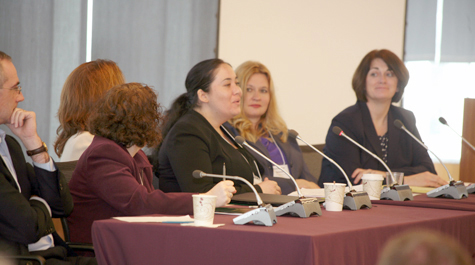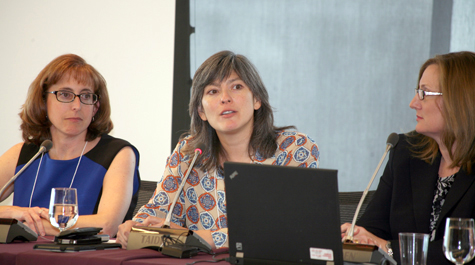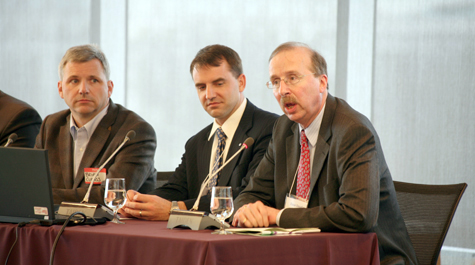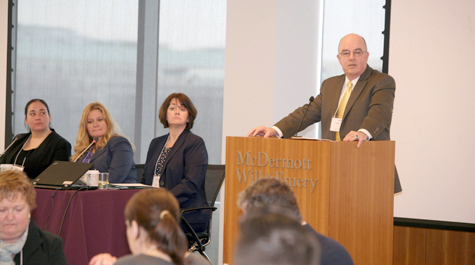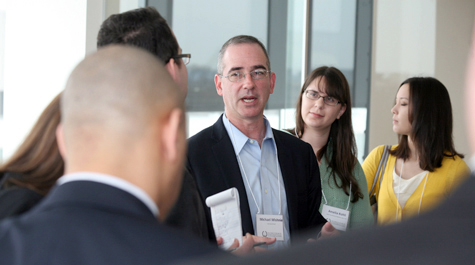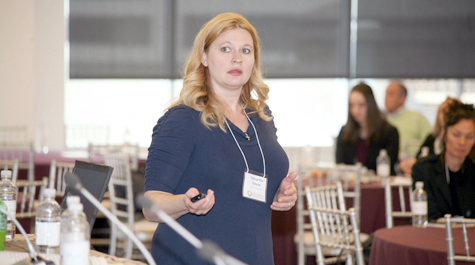Warner Provides Keynote at Veterans Clinic Conference
“The time for action is now” when it comes to helping veterans. That was the driving theme behind U.S. Sen. Mark R. Warner’s keynote address at William & Mary Law School’s “National Conference on Law Clinics Serving Veterans” on Thursday, April 3.
The free two-day program, hosted by the Law School's Lewis B. Puller, Jr. Veterans Benefits Clinic, was held at the offices of McDermott Will & Emery in Washington, D.C.
Law deans and faculty members from about 40 law schools and universities attended, as did lawyers from a wide range of law firms interested in providing pro bono representation to veterans. More than 100 lawyers and legal educators participated in the conference.
“Without question, the Puller Veterans Clinic is a win-win-win,” Warner said. “It’s a win for veterans who get the kind of caring assistance and speeding up of the claims process that only one-on-one contact can provide. It’s a win for law students…and it’s a benefit to the American taxpayer because the services are provided pro bono.”
With the conference opening the morning after a fatal shooting at Fort Hood military base near Killeen, Tex., Warner imparted a sense of urgency in getting more law schools and law firms involved in helping veterans.
“Just saying you’re open for business, that you’re going to try, isn’t enough; you have to go an extra mile because these men and women are coming back with enormous challenges,” Warner said. “Trying to make sure that they get the benefits they’ve earned helps decrease the kind of tension and pressure they go through as they try to assimilate back into their families and back into employment.”
In August 2013, the Puller Clinic became the first law school clinic in the nation to be invited to join the Department of Veterans Affairs Fully Developed Claims (FDC) Community of Practice. Now with five years in business and hundreds of cases under their belts, the directors and staff came primed to share best practices so that other universities and firms are better prepared to launch their own pro bono initiatives.
“If law clinics serving veterans can take root and flourish nationally they’ll become a serious force in the world of veterans’ affairs, making a real significant difference for the better,” said William & Mary president Taylor Reveley, who introduced Warner at the event.
Four panel sessions over the two days provided attendees with a wealth of information, beginning with a discussion of the legal needs of veterans and different clinic models that can be used to meet those needs. There was also a lengthy review of veterans’ psychological needs; an overview of how to find institutional support, design a clinic, fundraise, and find clients; and a discussion of interprofessional collaboration, including initiatives such as veterans courts, and Medical-Legal Partnerships supporting veterans.
Virginia’s Secretary of Veterans and Defense Affairs, Admiral John Harvey, was also on hand to deliver a powerful message on the importance of this work. Admiral Harvey’s message included the heroic and heartbreaking history of the clinic’s namesake and Law School alum, Lewis B. Puller, Jr., B.A. '68, 'J.D. 74, a history that underscores the need for pro bono clinics devoted to supporting veterans.
The conference ended with a two-credit CLE course introducing attendees to the law used in basic veterans benefits cases.
For Patricia Roberts, Director of William & Mary Law School’s Clinical Programs, the conference was a good first step in establishing connections that will grow quickly.
“The conference exceeded all our expectations. The panelists provided a wealth of insightful recommendations for attendees seeking to start pro bono initiatives, and the passion and enthusiasm the attendees exhibited in exploring ways to aid veterans was palpable,” Roberts said. “Moving forward, the Puller Clinic veterans’ clinic consortium will keep pro bono veteran legal service providers connected, and will continue to serve as a resource to law schools and law firms seeking to start new initiatives.”
Support for the conference was provided by the Coca-Cola Company; Covington & Burling LLP; craigconnects; Equal Justice Works; Ferguson; Holland & Knight; Honeywell; Kirkland & Ellis; McDermott Will & Emery; McGuireWoods; Nixon Peabody; Saul Ewing LLP; Virginia Law Foundation; Venable LLP; and other friends of the Puller Clinic.
About William & Mary Law School
Thomas Jefferson founded William & Mary Law School in 1779 to train leaders for the new nation. Now in its third century, America's oldest law school continues its historic mission of educating citizen lawyers who are prepared both to lead and to serve.




